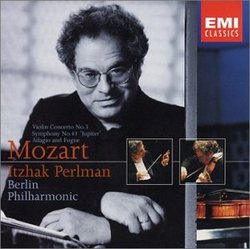Amazon.comThis live recording finds Perlman the violinist at the top of his form. Playing with consummate technical ease, a warm, radiant, glorious tone, elegant phrasing, captivating charm, and great expressiveness, he makes the Concerto sparkle and glitter, speak and sing, plead and laugh. Mood, tone, and character change in an instant; the music is suffused with golden sunshine and carefree joy. The slow movement is delicate and inward, the final Rondo robust and humorous. Not content with tossing off the usual cadenzas brilliantly, he regards every fermata as an invitation to improvise additional ones. The performance is a total delight. The Berlin Philharmonic sounds rich (no period-style influence here!) and supports his every thought and feeling. Perlman the maestro is more difficult to assess, especially with a great veteran orchestra in music that historically requires no conductor at all. Perhaps our ears have become attuned to hearing Mozart played by reduced, if not period instrument, orchestras, but the sound seems heavy and loud, without transparency or finesse. The texture is muddy, so the intricate polyphony, especially in the Symphony's amazing double-fugue, is lost. The Adagio and Fugue, written for string quartet, become bottom-heavy with the addition of a bass; the Adagio is monumentally slow. In the "Jupiter," there is much banging and crashing. The woodwind solos are lovely, but the brass blares. The slow movement, though warmly expressive, lacks a sense of direction: the runs that weave around the melody are shapeless, the accompanying chords static; the Minuet is rustic rather than courtly. One misses the charm, elegance, and buoyancy of Perlman the violinist. --Edith Eisler


 Track Listings (9) - Disc #1
Track Listings (9) - Disc #1